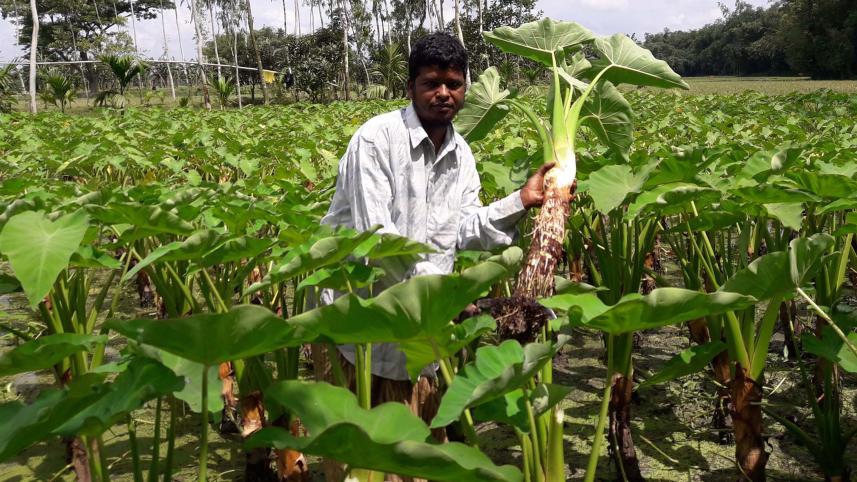Taro farming gets popular

Two farmers of Chirirbandar upazila of the district became solvent by farming taro plants (Colocasia Esculenta), locally known as lotiraaj kachu, of Araceae family.
They are Monzer Ali of Satnala village and Mohammad Ali of Rasulpur village.
“I have been involved with agriculture for the last 10 years,” Monzer told this correspondent while narrating how he brought his family out of poverty by cultivating taro.
Many villagers are now growing taro after consulting with him, Monzer said.
Monzer, a father of two, said he borrowed Tk10,000 from a local non-governmental organisation and planted taro on 10 kathas of land four years ago, adding that he repaid the loan after getting a good profit, and extended his farming area to 20 kathas next year. After that, he never looked back, Monzer said.
This year, he cultivated taro plants on two acres, Monzer said, adding that he earned Tk 2.5 lakh from taro farming last year.
Taro farming is easier than farming other crops, and requires less nursing and pesticide, he said, adding that taro plants start producing loti (stem) within three months of planting and growers can collect the loti for up to six months. The taro plant's stem, petioles and corms can be eaten as vegetables, he added.
He sold the stem for Tk 30 per kg, while each taro plant can be sold for Tk 20, Monzer said.
He planted 24,000 taro plants on two acres of land this year and his expense was Tk 60,000, adding that he was expecting Tk 4.5 lakh profit.
Last year, he bought 20 kathas of land and built a tin-roofed semi-concrete building, Monzer said.
Wholesale buyers of the district and surrounding districts purchase his produce directly from his crop field, he siad.
Mohammad Ali said he cultivated taro on 30 kathas of land this year, while it was four or five kathas five years ago. A farmer can earn Tk 1.5 lakh by growing taro on one acre as its corms, petioles and stems have high demand in the market.
“Nothing of a taro plant is wasted,” he said with a smiling face.
Agriculture Officer in Chirirbandar Upazila Mahmudul Hasan said the land of the upazila is suitable for taro farming and Monzer and Mohammad Ali are taking getting advantage of the soil and the demand for taro.
 For all latest news, follow The Daily Star's Google News channel.
For all latest news, follow The Daily Star's Google News channel.